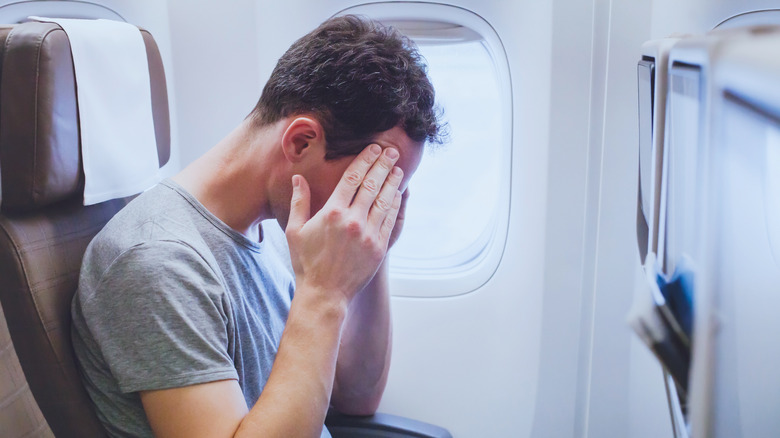Things That Make Your Motion Sickness Worse
Motion sickness, or travel illness, is a common experience when traveling by car, plane, boat, bus, or train. You can also experience motion sickness while on amusement park rides. According to WebMD, symptoms of motion sickness include dizziness, nausea, excessive salivation, reduced or no appetite, cold sweats, shallow breathing, headache, and fatigue.
Motion sickness occurs when your brain is confused about the information coming in from what you're seeing and hearing. Your brain relies on this information from your senses to determine what is happening. As a result, it can easily become disoriented when traveling (via the Cleveland Clinic). According to WebMD, your inner ear plays a considerable role in your balance, letting your brain know whether you're standing, sitting, or lying down. So when traveling, if you're not looking outside, your eyes are telling your brain you're not moving, but your body is saying you are.
According to Verywell Health, keep your focus on the outside of the car rather than the inside. Being a passenger can also make motion sickness worse. Additionally, from a psychological standpoint, if you anticipate you're going to get motion sickness, you are more likely to experience it. Kids and pregnant women are more susceptible to travel illness. In addition, some medications can make motion sickness worse but the effect is different for everyone.
Ready to banish motion sickness? Prepare for your next trip and enjoy it.
Eliminate motion sickness
Make your symptoms better — or at least reduce them — with these tips.
If you take medication that contributes to motion sickness, ask your doctor if you can switch medications or skip a dose while traveling. Additionally, look out a window so your eyes send that signal to your brain that you are moving (via Verywell Health).
Healthline recommends trying a different position. If you can, try lying down or standing up. You might feel better in one position over another. Ask to drive. Notice how the person driving never seems to get motion sickness? Your brain is able to make sense of what's happening when you're the one driving. Crack a window for some fresh air if you can and sip water to stay hydrated. Try munching on a light snack to ease nausea and avoid fast food or heavy meals before and during travel.
Ask your doctor about medications that can help with motion sickness symptoms. For example, they can prescribe scopolamine or promethazine for nausea. You can also try an over-the-counter antihistamine. Take a dose about an hour before your trip and every six hours during.


